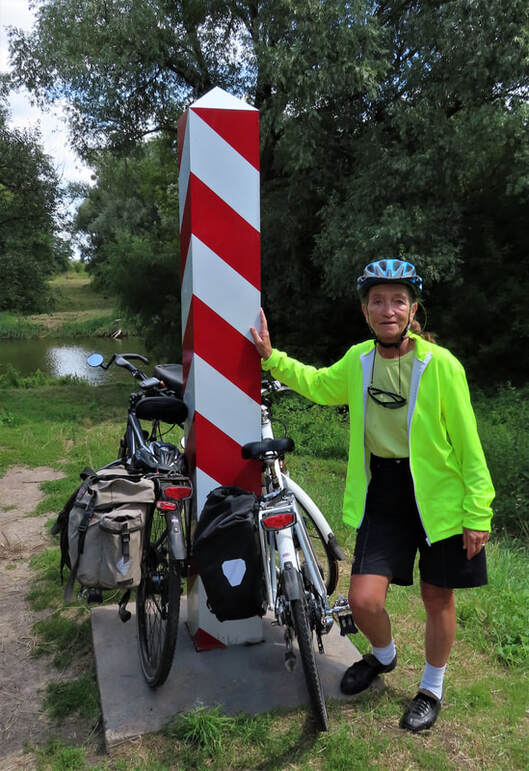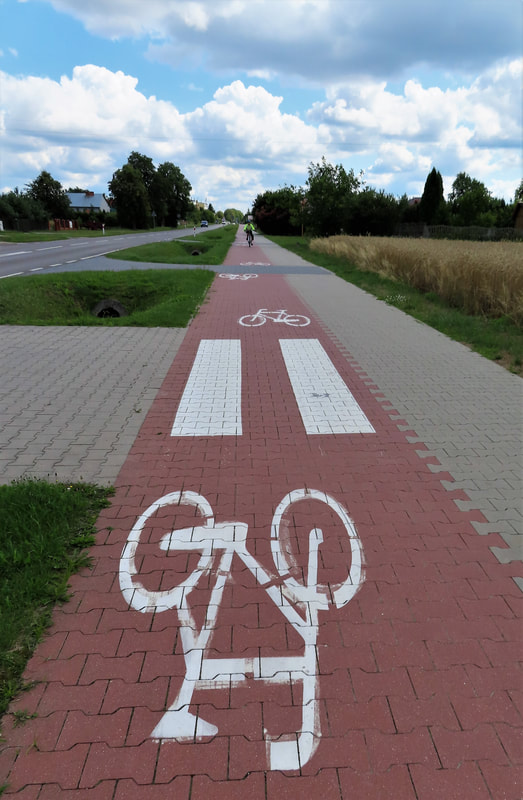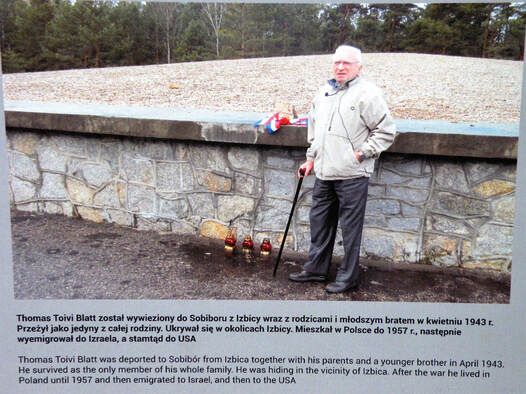Dreaming
Barry Williamson
March 2022
March 2022
We’re keeping busy here in the Fylde with the usual stuff, which now includes following events in the Ukraine with a close eye. Sometimes, for one of us, late into the evening it becomes a closed eye (but still listening). We never actually got into Ukraine but know its borders well, having reached and followed them on many occasions, including by bicycle from England in 1988 through Germany and the then Iron-Curtained Czechoslovakia. Since that time we have met Romania’s, Hungary’s, Slovakia’s and Poland’s borders with Ukraine on several occasions.
Below is a picture of Margaret at the border of Poland with Belarus, which lies just across the narrow and shallow River Bug, seen in the background. This is in Wlodawa in the far East of Poland, a town which has the most amazing network of cycle paths, also seen in a picture below.
A few miles south of the town, the Bug also forms part of Poland’s border with Ukraine (the three countries meet nearby). Along that river the Germans built three extermination camps, not to provide slave labour for surrounding German industrial units (as Auschwitz also did) but simply to exterminate – straight off the train and into the gas chamber using the exhaust of a diesel engine taken from a captured Russian tank.
Sobibor is one such camp less than 10 miles south of Wlodawa. We have visited it three times, once spending a night in the motorhome at its entrance in the lonely empty mist of the forest. We had with us a book From the Ashes of Sobibor by Thomasz Blatt (see picture below), the one person to have actually escaped from the camp and survive. Aged only 16, he was selected to cut the hair of naked women before they were gassed, thereby securing his own life for a while. In the book he wrote of lying in his bunk in the camp, dreaming of the world outside beyond the guards, the dogs, the electric fence. Reading his words, we lay in our bunks just outside, dreaming of all the people taken inside, many of them from the Netherlands, whose only remains are a small part of the huge surviving mound of ash.
What a contrast between societies: the holocaust and mass murder of innocent people south of town; today’s bike paths for the innocent pleasure and safety of people to the north. Clearly, not enough was learned for the West to be prepared for dictators to rise again. Which side of town will win?
The whole nature of what we used to call the ‘future’ has changed almost beyond recognition, perhaps driving us back into a greater concentration on the present and hopefully eschewing too much wallowing in the past. Although every conversation we have with people of a similar age, and there are many such opportunities in the bungalow-land that lies twixt Blackpool and Fleetwood, is that we somehow feel more adjusted to having lived so many years. They have been good years for the most part, full of opportunity which, if we didn’t take it, no longer exists and will soon no longer even be a word. Future and opportunity will be replaced by one word: survival - and not necessarily of those most fitted to the task.
What we do have, in what is now known only as a ‘possible future’, is a booking on the overnight ferry from Newcastle (in fact North Shields) to Amsterdam (in fact the nearby port of Ijmuiden) on the 25th of April (ie once Easter is over). The aim is just to return to the mainland and the roads and bike paths where we belong, albeit now subject to the constraints of being foreigners in the Schengen Zone. What a combination – Brexit, Pandemic, Johnson, and now Putin - all wrapped up in controls, regulations and restrictions.
Barry remembers the RAF National Serviceman’s (no women) prayer: ‘Roll on Death, Demob’s too far away!’ Like our man in Sobibor, we can only dream, knowing that a pile of ash ultimately awaits us all.
Below is a picture of Margaret at the border of Poland with Belarus, which lies just across the narrow and shallow River Bug, seen in the background. This is in Wlodawa in the far East of Poland, a town which has the most amazing network of cycle paths, also seen in a picture below.
A few miles south of the town, the Bug also forms part of Poland’s border with Ukraine (the three countries meet nearby). Along that river the Germans built three extermination camps, not to provide slave labour for surrounding German industrial units (as Auschwitz also did) but simply to exterminate – straight off the train and into the gas chamber using the exhaust of a diesel engine taken from a captured Russian tank.
Sobibor is one such camp less than 10 miles south of Wlodawa. We have visited it three times, once spending a night in the motorhome at its entrance in the lonely empty mist of the forest. We had with us a book From the Ashes of Sobibor by Thomasz Blatt (see picture below), the one person to have actually escaped from the camp and survive. Aged only 16, he was selected to cut the hair of naked women before they were gassed, thereby securing his own life for a while. In the book he wrote of lying in his bunk in the camp, dreaming of the world outside beyond the guards, the dogs, the electric fence. Reading his words, we lay in our bunks just outside, dreaming of all the people taken inside, many of them from the Netherlands, whose only remains are a small part of the huge surviving mound of ash.
What a contrast between societies: the holocaust and mass murder of innocent people south of town; today’s bike paths for the innocent pleasure and safety of people to the north. Clearly, not enough was learned for the West to be prepared for dictators to rise again. Which side of town will win?
The whole nature of what we used to call the ‘future’ has changed almost beyond recognition, perhaps driving us back into a greater concentration on the present and hopefully eschewing too much wallowing in the past. Although every conversation we have with people of a similar age, and there are many such opportunities in the bungalow-land that lies twixt Blackpool and Fleetwood, is that we somehow feel more adjusted to having lived so many years. They have been good years for the most part, full of opportunity which, if we didn’t take it, no longer exists and will soon no longer even be a word. Future and opportunity will be replaced by one word: survival - and not necessarily of those most fitted to the task.
What we do have, in what is now known only as a ‘possible future’, is a booking on the overnight ferry from Newcastle (in fact North Shields) to Amsterdam (in fact the nearby port of Ijmuiden) on the 25th of April (ie once Easter is over). The aim is just to return to the mainland and the roads and bike paths where we belong, albeit now subject to the constraints of being foreigners in the Schengen Zone. What a combination – Brexit, Pandemic, Johnson, and now Putin - all wrapped up in controls, regulations and restrictions.
Barry remembers the RAF National Serviceman’s (no women) prayer: ‘Roll on Death, Demob’s too far away!’ Like our man in Sobibor, we can only dream, knowing that a pile of ash ultimately awaits us all.

On the edge of the Polish town of Wlodawa, Margaret is standing by a post marking the border with Belarus which is just on the other side of the River Bug.

Margaret on a splendid cycle path leading north out of the Polish town of Wlodawa which is on the border with Belarus

Thomasz Blatt, revisiting Sobibor in later life, stands and remembers by the symbolic pile of Ash.